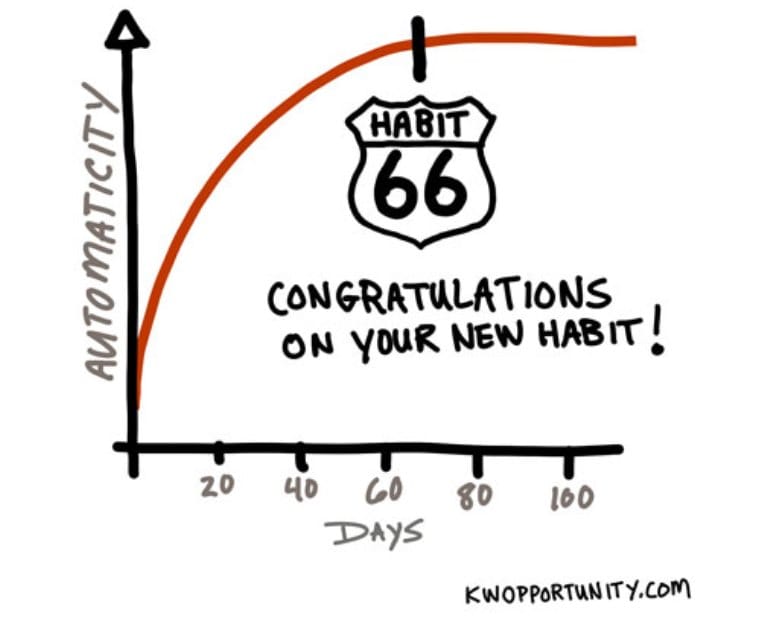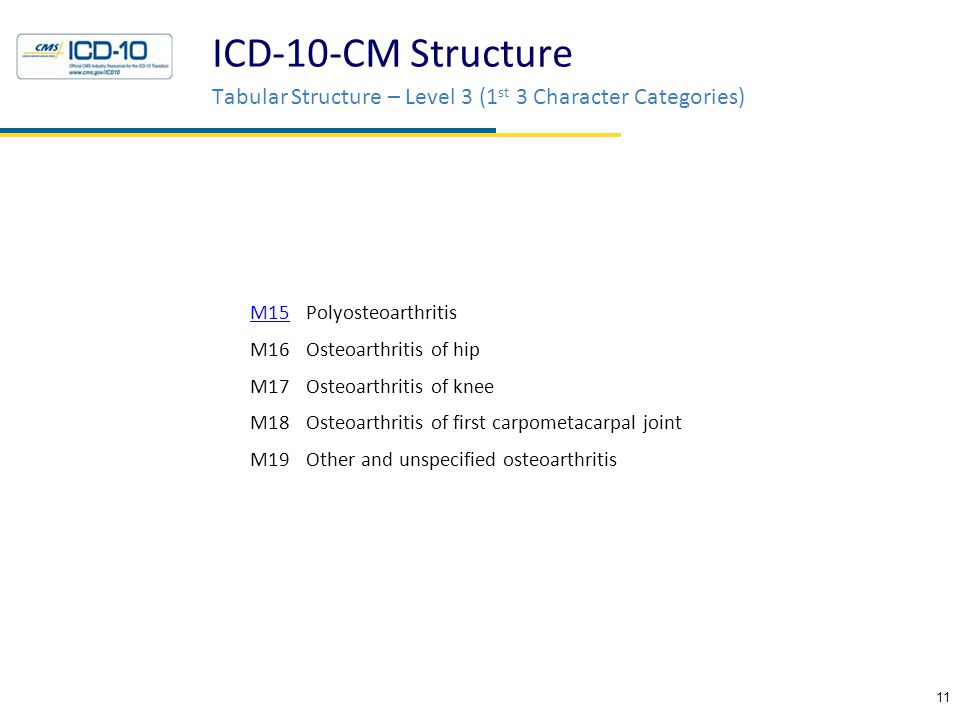66 days habit
Need to Form a New Habit? Give Yourself At Least 66 Days
A lot of the change that comes about through a process like psychotherapy (or even just reading a self-help article or book and trying to put those ideas into effect in your life) requires forming new habits. Habits of thinking differently, of reacting differently, of behaving differently. And it can be a frustrating process as you wait for these changes to take effect and become more automatic, as habits do.
How long does it take to form a new habit? A week? A month? A year?
Contrary to popular opinion, most people will not be successful at forming a new habit in their life in just 21 days. It’s too short a time period for the neuropathways to form the habit-friendly patterns in your brain for the new behavior you’re trying to embrace.
The myth of 21 days may have come, according to PsyBlog, from a book about research conducted on how long it took amputees to adjust to the loss of a limb. But that research was published in 1960 and didn’t really examine habits, but rather adaptation to a life-changing event.
Researchers (Lally et al., 2009) wanted to better understand how long it took, on average, for a group of people to form a new habit in their life, such as going for a daily run or eating a piece of fruit every day. The study was published in the European Journal of Social Psychology by Phillippa Lally and colleagues from University College London.
At least 2 months (or about 66 days, on average), according to this study of 96 people. And good news — the researchers did not find that missing one opportunity to perform the new habit behavior did not materially affect the habit formation process. You can safely forget or skip a day and still successfully build that new habit.
Back in 2009, PsyBlog examined the topic for a blog entry that looked at what the research tells us about how long it takes us to form a new habit. Here’s what they had to say:
Although the average was 66 days, there was marked variation in how long habits took to form, anywhere from 18 days up to 254 days in the habits examined in this study.
As you’d imagine, drinking a daily glass of water became automatic very quickly but doing 50 sit-ups before breakfast required more dedication (above, dotted lines). The researchers also noted that:
- Missing a single day did not reduce the chance of forming a habit.
- A sub-group took much longer than the others to form their habits, perhaps suggesting some people are ‘habit-resistant’.
- Other types of habits may well take much longer.
So 66 days later, a simple habit might be in place and on automatic pilot. But as the research shows, it could as long as 8 and a half months for more complicated habits to take hold.
Don’t let this dissuade you from trying to retain a new habit. The simple upshot from this research is that habits take time to form — likely 3 times as long as you may have thought. If you’re like most people, give yourself at least 3 months to form a habit, and your new habit should take hold in your life without further effort.
Need to Form a New Habit? Give Yourself At Least 66 Days
A lot of the change that comes about through a process like psychotherapy (or even just reading a self-help article or book and trying to put those ideas into effect in your life) requires forming new habits. Habits of thinking differently, of reacting differently, of behaving differently. And it can be a frustrating process as you wait for these changes to take effect and become more automatic, as habits do.
How long does it take to form a new habit? A week? A month? A year?
Contrary to popular opinion, most people will not be successful at forming a new habit in their life in just 21 days. It’s too short a time period for the neuropathways to form the habit-friendly patterns in your brain for the new behavior you’re trying to embrace.
The myth of 21 days may have come, according to PsyBlog, from a book about research conducted on how long it took amputees to adjust to the loss of a limb. But that research was published in 1960 and didn’t really examine habits, but rather adaptation to a life-changing event.
Researchers (Lally et al., 2009) wanted to better understand how long it took, on average, for a group of people to form a new habit in their life, such as going for a daily run or eating a piece of fruit every day. The study was published in the European Journal of Social Psychology by Phillippa Lally and colleagues from University College London.
At least 2 months (or about 66 days, on average), according to this study of 96 people. And good news — the researchers did not find that missing one opportunity to perform the new habit behavior did not materially affect the habit formation process. You can safely forget or skip a day and still successfully build that new habit.
Back in 2009, PsyBlog examined the topic for a blog entry that looked at what the research tells us about how long it takes us to form a new habit. Here’s what they had to say:
Although the average was 66 days, there was marked variation in how long habits took to form, anywhere from 18 days up to 254 days in the habits examined in this study.
As you’d imagine, drinking a daily glass of water became automatic very quickly but doing 50 sit-ups before breakfast required more dedication (above, dotted lines). The researchers also noted that:
- Missing a single day did not reduce the chance of forming a habit.
- A sub-group took much longer than the others to form their habits, perhaps suggesting some people are ‘habit-resistant’.
- Other types of habits may well take much longer.
So 66 days later, a simple habit might be in place and on automatic pilot. But as the research shows, it could as long as 8 and a half months for more complicated habits to take hold.
Don’t let this dissuade you from trying to retain a new habit. The simple upshot from this research is that habits take time to form — likely 3 times as long as you may have thought. If you’re like most people, give yourself at least 3 months to form a habit, and your new habit should take hold in your life without further effort.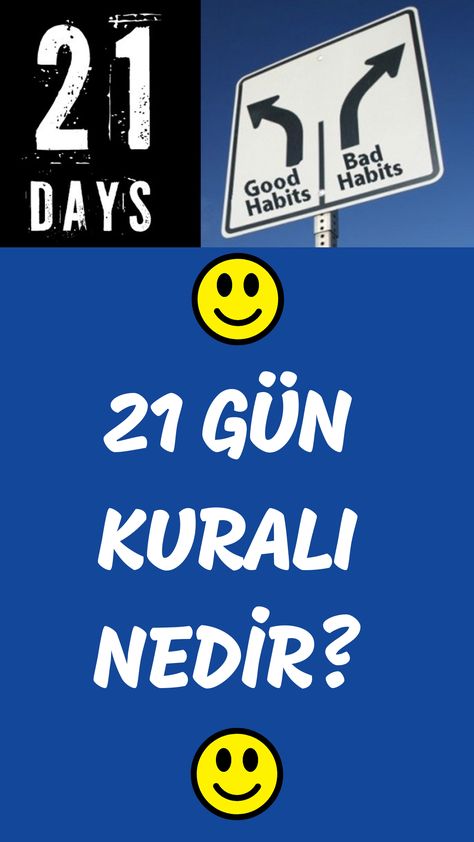
It takes an average of 66 days to develop a good habit
It takes an average of 66 days to develop a good habit - Gazeta.RuActress Zoë Kravitz says Big Little Lies is unlikely to have a third season 18:35
The coach of the Russian national team Karpin supported the idea of holding the return match with Uzbekistan 18:29
Fox News: Chinese defense minister agreed to meet with US defense secretary 18:27
A two-story motorhome with a terrace was introduced in China 18:26
Germany announced the preparation of a plan in case of war with Russia 18:25
Repairmen blew up a huge battery with a nail gun 18:24
The trailer for the new Pixar cartoon "Elemental" has been released 18:21
Marvel Film Producer Reveals How The Studio Chooses New Characters For The Universe 18:21
Turkiye: A checkpoint on the border between Turkey and Syria came under rocket attack 18:16
The director of Dzhigurda denied information about the lost trial for a multi-billion dollar . .. 18:14
.. 18:14
Science
Unlike drug cravings that develop after the second or third dose, good habits take much longer. It takes about 66 days to start running in the evenings without the accompanying carrot and stick.
Who gets up early gets tired quickly
"Larks" in fact are even more sleepy than "owls". People prone to early...
April 24 12:45
If we were aware of each of the actions performed, then in a few minutes we would certainly go crazy and, moreover, would not be able to notice the events taking place around us: routine procedures would require too much effort and attention - writing, speech, reading, the usual shaking hands at a meeting, tying a tie and other rituals.
To understand how much automatic actions occupy our lives, it is enough to take off your watch for one day and count how many times you look at an empty hand.
As shown by Jane Wardle of the Health Lifestyle Research Center at University College London and her colleagues,
it takes an average person about 66 days to bring a certain action to automatism.
Carousels instead of a dose of
The "generation of alcoholics and drug addicts" is not lost, and you can get rid of its addiction in the same way as...
October 28 10:52 am
Over the course of 12 weeks, 96 volunteers did one of three things a day - adding fruit to their dinner menu, going for a 15-minute jog in the evening, or drinking a certain drink. The main condition was precisely “for dinner” – thus, scientists determined the specific moment for developing an automatic action. The degree of automatism was assessed on a standard scale - the participants filled out the questionnaire every day. A habit was considered acquired only if the performance of the action did not require moral effort and did not cause spiritual contradictions.
As suggested by the authors of in the European Journal of Social Psychology publication , the complex activity of jogging took the most time, while fruit or a drink "for dinner" required less effort.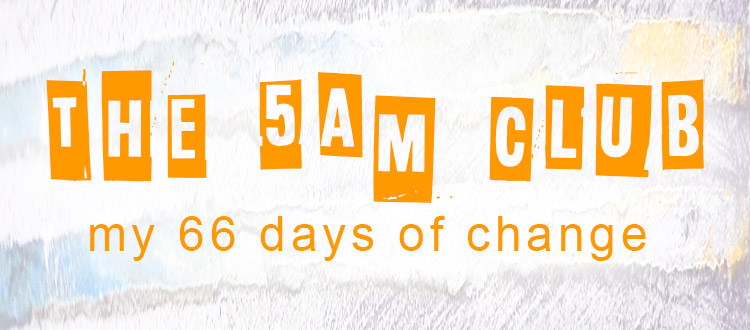 On average, the participants began to perform the action "without thinking" after 66 days after the start of the experiment.
On average, the participants began to perform the action "without thinking" after 66 days after the start of the experiment.
Mechanisms for the formation of habits of this kind are not yet fully understood.
An awl to the brain
The thirst for new sensations and the desire to take risks is not an individual, but a species trait common to all...
June 26 18:00
The fact is that bad habits, which can often be called addiction, are reinforced by the “reward system” located in our brain. Gambling, smoking, alcoholism, drug addiction, as well as "gluttony and adultery" have quite clear biological foundations, which are also determined by our smaller brothers. There are ways to stimulate their education and, conversely, to deal with excessive addiction.
To bring "good habits" to automatism, something more is required - the constant repetition of an action under specific conditions until the moment when these conditions (in this case, evening time, dinner) will not independently cause an unconscious need for action. Perhaps in the future, when scientists manage to get volunteers to run around in MRI scanners, it will become clear how these habits appear.
Perhaps in the future, when scientists manage to get volunteers to run around in MRI scanners, it will become clear how these habits appear.
Until the moment when a person begins to perform an action without being aware of it, everything will be held solely by "willpower" --
for example, in the mentioned experiment, only 82 out of 96 volunteers reached the "end".
Nevertheless, this information is quite enough for practical recommendations: firstly, almost any person can be forced to perform even not the most pleasant action "on the machine"; secondly, a healthy lifestyle can also be introduced into a habit; and thirdly,
if you started a “new life” in the New Year, then you can relax and “turn off” your willpower exactly by March 8th.
Although Wardle and coauthors have not yet figured out how long it will take to get rid of these very habits, it will most likely be much less impressive time.
Subscribe to Gazeta.Ru in News, Zen and Telegram.
To report a bug, select the text and press Ctrl+Enter
News
Zen
Telegram
Picture of the day
Russian military operation in Ukraine. Day 270
Online broadcast of the Russian military special operation in Ukraine — Day 270
Fire with an explosion in the center of Moscow: people may be blocked in the building meters
“Even Pelevin may suffer”: a publisher about what awaits the book market after the ban on LGBT propaganda
Eksmo publishing house told which works may be affected by the ban on LGBT propaganda
Deputy Prime Minister of Ukraine Stefanyshina: Kyiv will check the video with the execution of Russian prisoners of war
Turkiye: A checkpoint on the border between Turkey and Syria came under rocket attack
An eyewitness to the rescue of a girl from an icy river in Yoshkar-Ola said that she survived thanks to a hood
48-year-old Eva Mendes confirmed that she married 42-year-old Ryan Gosling
News and materials
Actress Zoë Kravitz says Big Little Lies is unlikely to have a third season
The coach of the Russian national team Karpin supported the idea of holding a return match with Uzbekistan
Fox News: Chinese defense minister agreed to meet with US defense secretary
A two-story motorhome with a terrace was introduced in China
Germany announced the preparation of a plan in case of war with Russia
Repairmen blew up a huge battery with a nail gun
The trailer for the new Pixar cartoon "Elemental"
has been releasedMarvel Film Producer Reveals How The Studio Picks New Characters For Universe
The director of Dzhigurda denied information about the lost trial for a multibillion-dollar inheritance
Mascot of the 2018 World Cup Zabivaka took part in the opening ceremony of the World Cup in Qatar
Vodonaeva called Madonna "city crazy"
Ex-functionary of Dynamo Oreshchuk turned off the TV in the middle of the Russia-Uzbekistan match
Erdogan told what price the West will pay for "isolation" of Russia
Trump told when he will return to Twitter
Actress Amy Adams expressed her desire to reprise her role as Lois Lane in the DC comics films
Buzova sang about her boyfriend who escaped from Russia
Karpin said that he was worried about the game of the Russian national team
REN TV: two people were injured in a fire at a warehouse in the center of Moscow
All news
Slow fire fighting. Why the West does not supply tanks and aircraft to Ukraine
Why the West does not supply tanks and aircraft to Ukraine
What is the purpose of the collective West in the confrontation between Kyiv and Moscow
"Kyiv - the capital of Ancient Rus'". Medvedev commented on the plans of the Ukrainian authorities to "return the Crimea"
The head of Zelensky's office, Yermak, said that Ukraine plans to launch an offensive in Crimea
Again dull zeros and not a single goal in two matches: how the Russian team ended the year
The Russian team played a draw with the Uzbekistan team in a friendly match
Pinpoint strikes on headquarters and caves. Turkey retaliates for Istanbul bombing
TRT: Erdogan orders operation in Iraq and Syria after G20 summit
"The voice of the people is the voice of God. " Musk unbanned Trump on Twitter
" Musk unbanned Trump on Twitter
Elon Musk restored Donald Trump's Twitter account based on a poll
“Hug, give a lollipop, count buttons”: how to recognize a panic attack and cope with it
Kazennykh’s psychiatrist spoke about physical signs of stress
They could celebrate the "crown wedding". But they were buried together
Doctors and chemists on how to care for your skin in winter so as not to harm your health
Khimik Sharova: in winter you need to choose a cream with oils in the composition of
My husband is sure that my male friends only want sex from me
A teacher from Moscow talks about his friendship with other men
"Pirate erotica". How Dendy was hacked in the 90s and made porn games for her
How Dendy was hacked in the 90s and made porn games for her
Sexy Invaders, Dragon Quest and other erotic games from the 90s for retroconsoles
“NATO is not a threat to Russia”: the Pentagon assured that they would not enter into a conflict in Ukraine
Pentagon chief Lloyd Austin warned that a "harsh winter" awaits Ukraine
“For example, until the end of December”: The Ministry of Defense of Ukraine suggested that the Armed Forces of Ukraine could return to Crimea
Deputy Minister of Defense of Ukraine Gavrilov predicted the end of the conflict with Russia by spring
“We are with you to the end”: new British Prime Minister Rishi Sunak met with Zelensky
British Prime Minister Rishi Sunak promised to transfer 125 anti-aircraft guns to Ukraine
Alena Solntseva
With open eyes
About awkward moments in history
Dmitry Vodennikov
Butterfly horror
About self-destruction and forbidden answers
Elena Panina
Democratic dictatorship
Elections to the US Congress
Anastasia Mironova
Make money before nationalization
About what the competition of social networks will lead to and why everyone will be connected to monetization
Marina Yardaeva
Wanting is not harmful
For those who need three arshins of land
-->
See also
Error found?
Close
Thank you for your message, we will fix it soon.
Continue reading
how to rebuild the brain in two months - Personal experience on vc.ru
The brain is used to following the simplest path and retaining old habits. But there are ways to outwit him.
187 733 views
Translation of the material of the founder of Brain by Design James Garrett was prepared by the publication "Ideonomics".
If you had seen me a few weeks ago on a typical Thursday morning, you would have wondered if I was all right. I started smiling all of a sudden and couldn't stop. The rush of satisfaction was too great. Finally got it. My years of trying have paid off.
Why such euphoria? With deep satisfaction, I put an "X" on the calendar, which meant that I had completed day 66 of my new morning routine: reading, exercising, and meditating.
How is the 66th day different from the rest? The researchers found that the average time it takes to form a new habit is 66 days.
I liked connecting my project to Kerouac, so I decided to make it my goal to build my own neural Route 66 in 66 days.
It was not an easy journey. It was more like trying to learn to write with your left hand: doable, but painful.
One day I was returning from a performance at an event that was four hours away from my home. After a long grueling day of talking to complete strangers, I crawled into my car and drove home. As I pulled into my driveway at 11:45 p.m., I suddenly remembered that I hadn't done a new routine in my morning rush.
If I stay up to do this, I won't be able to sleep tomorrow because I have to speak at an early morning webinar that I haven't prepared for yet. I sat staring at my steering wheel - all the neighbors around me were fast asleep - and I knew that I had to make a terrible choice. Skip one day (maybe I can do it tomorrow?) or do something irrational - swallow a bitter pill and set aside an hour right now for reading, exercise and meditation.
While research shows that missing a day doesn't necessarily mean failing a habit, I found that it did for me personally. Having got out of the knurled rut, it is difficult for me to return to it.
Having got out of the knurled rut, it is difficult for me to return to it.
Knowing this, I reminded myself that in order to really instill a habit in yourself, you need to do this procedure every day, without thinking, for the first 66 days. So I went through the whole routine and then dragged myself to bed at 1:15 at night.
I have tried to apply brain science to form habits that bring happiness, focus, and productivity. In this article, I'll share what I've learned and how you can go through the difficult journey of habit change: overcome the inertia of old habits and establish new ones.
The Neuroplasticity Revolution
One of the most revolutionary discoveries made in the last few decades is how plastic our brains are. Before this paradigm shift, scientists thought that the brain didn't change after about 25 years. This is not true: our brain is constantly being updated. Tomorrow you will have a different brain than today. And this happens throughout life. In one study involving people aged 57-72, scientists found that their brains create between 500 and 1,000 new neurons in the hippocampus alone every day.
In one study involving people aged 57-72, scientists found that their brains create between 500 and 1,000 new neurons in the hippocampus alone every day.
So why is it so hard for us to change when the brain is so easy to change? Why do we need to repeat something for so long before it becomes a habit?
Smart Brain/Stupid Brain
I hate to give bad news, but your brain is smart and stupid at the same time. The key is to learn how to use a smart brain to outsmart a stupid one.
In other words, your brain's main job is to keep you safe. He likes to know what will happen next, he likes to predict the future. Thus, the brain maintains the status quo with all its might, not because it is good for you, but because it is predictable. Change, from the point of view of the brain, can mean danger. (That's the stupid part of him.) No, there's no real danger. But your brain doesn't know that (and frankly, it doesn't care). The neural logic of his operating system tends to keep things the same. Unless you convince him that the changes you are trying to make are really important.
Unless you convince him that the changes you are trying to make are really important.
How to do it? This is where “doing without thinking” comes to the fore.
If I ever allow myself to skip classes because I feel exhausted, then naturally I will always think about this loophole - a loophole that often becomes an abyss. On the other hand, if I tell myself there are no exceptions, I will look for opportunities to get things done earlier in the day (my brain hates going to bed at 1:15 even more than I do). Over time, a daily (and sometimes irrational, like my morning routine at midnight) sequence convinces the brain that it has a new task to do—a new activity to happen every day.
The sequence is the key
I have been trying to train for many years. You know - I'll start, then I'll quit. It's not that I don't have light streaks. Were. Like the 7-minute NYTimes workout right before you shower. Or the time when I went for a walk right after waking up.
But I've always had problems with persistence. After a successful two weeks, I am inevitably unsettled. Then I come back, then I fall out again, I come back again ... in a word, you understand. After a few turns, I was out of breath. It wasn't an upward spiral, it was a circle. Each time it became more and more difficult to move on. Why can't I build up enough momentum to sustain meaningful change?
The problem was not motivation. Not in insufficient effort. Not that the goal was too hard (at one point I tried doing a 30-second plank instead of a whole workout). Everything was much easier. I didn't do the right thing consistently for enough days in a row.
My new morning routine was part of a larger year-long quest to rewire my brain—and I knew this year would be different and I needed to get serious about how stubborn my brain was.
Why is it difficult to form new habits
It turns out that there is a lot of energy in the brain - it just doesn't like to use it. At the neuronal level, it is literally a form of metabolic energy (or the ability of neurons to fire repeatedly).
At the neuronal level, it is literally a form of metabolic energy (or the ability of neurons to fire repeatedly).
As Daniel Coyle argues in his brilliant book, The Talent Code, the brain is sparingly accumulating its power. Imagine Uncle Scrooge standing in front of a vault full of energy - with that scowl on his face - and you get the whole picture. Old habits are always a simpler and less energy-intensive program for the brain. Given a choice, the brain will always prefer the easier option.
Notice I said that your brain likes to stick to old habits, not "bad" habits. Your brain doesn't really care about habits. It doesn't matter if the old habit is good or bad, its logic is simpler. The brain only cares about how easy or difficult it is to run a neural program.
If you run a program for months or years, it's easy - it becomes the default program. If the program has only been running for a few days, it's difficult - so you need to put in more effort to get Scrooge to open the vault.
But once you convince him to open the vault for, say, 66 consecutive days, you have a new default program. What used to be difficult becomes easy. What used to take effort is now easy. Scrooge changed his attitude.
From dirt roads to super highways
Another problem with the brain is that it likes to take the path where people travel the most. Give him a choice and he will always choose the neural highway. Imagine that you are driving through the Nevada desert - nothing but sagebrush for miles around.
Now imagine that you want to get from Las Vegas to Los Angeles. Highway I-15 is, of course, the fastest route, and you will probably choose it. Now imagine that you are buckling up and driving through a sagebrush. What happens to the speed of the car? What is your focus right now? Is it more pleasant or less? The target is still Los Angeles. You are simply taking a less efficient route. Will you get there? Of course. (If your car has four-wheel drive. ) Will it take longer and be more painful? Definitely.
) Will it take longer and be more painful? Definitely.
But if you drive on a less popular road day after day, driving through the same piece of desert over and over again, eventually you will leave wheel tracks. Perhaps your speed will increase not much, but at least ... up to 15 miles per hour.
Now imagine that you are not the only one who drives there. Hundreds - maybe thousands - of cars drive over the same land again and again. The end result is a dirt road. Now you can increase your speed to 30 miles per hour.
The faster the speed, the more cars are likely to want to use this route, and soon tens of thousands of cars are driving on the same dirt road. We have now come to the attention of the Nevada Department of Transportation.
Obviously, if there is enough demand for an alternative route to Los Angeles (based purely on frequency of use), it seems logical that more resources should be invested in it. Soon the ministry decides to pave the way. Cars can now reach speeds of up to 60 miles per hour on this road. Serious breakthrough.
Serious breakthrough.
But what if there are too many cars? What to do if hundreds of thousands of cars drive along this road every day, and traffic jams form there? In this case, even more resources will be invested and the road will become a multi-lane freeway.
What does all this have to do with the process of habit formation? Direct. Your brain is nothing more than a complex interconnected system of neural wheels, dirt roads, a two-lane highway, and a six-lane highway.
Every day your brain tries to decide where to put its resources. It distributes these resources depending on which areas of the brain are more active. New morning routine? Excellent! Send reinforcements. Habitual road rage? Great! Reinforce anger circuits. Negative internal conversation? Super! New neurons need negative conversations. Meditation? Wonderful! Strengthening the prefrontal cortex. Your brain decides where to invest energy based on usage. Neuroscientists call this phenomenon “activity-dependent neuroplasticity”—areas that are used get enhanced.
There are many ways to rewire the brain. The first is called neurogenesis, or the growth of new cells. Remember those 500-1000 new neurons in your hippocampus every morning? They have to go somewhere, and the brain distributes them on demand.
Another way the brain changes is neuroplasticity, a fancy word for the ability of the brain to rewire itself. If you use a certain part of your brain over and over again - just like a muscle - a particular path will form, and other underused paths will weaken.
Neuroplasticity takes many forms, but one of the most interesting is the creation of the myelin sheath (or myelin for short). Myelin works as a kind of insulation for neural pathways, helping neural signals travel faster and more efficiently to areas that receive a lot of traffic.
Myelin, made of fatty tissue that wraps around the longest part of the neuron (the axon), is like a pavement that allows for speed. The more layers of myelin, the faster your brain's signals are transmitted. The faster these signals travel, the faster you think and the easier it is to implement the habit.
The faster these signals travel, the faster you think and the easier it is to implement the habit.
Nerve conduction velocity can be measured. Although the measured value depends on a number of factors, it is largely influenced by myelin "isolation". A weakly isolated neuron moves at about 2 miles per hour. A completely isolated neuron is about 200 miles per hour. And if that's not enough, myelin can also reduce the amount of time between neural firings by up to 30 times. This is great potential. How to get access to it? Challenge your brain by taking the unpopular neural path. Again. And again. And again.
In those moments in the past when I was unsettled, my brain just wanted to get back on the comfortable neural road where there was no exercise. Since training was not my default program, every time I started driving on the “neural dirt road”, my brain protested. But with a bit of stubbornness, day after day, I returned to the dirt road - and, as the poet Robert Frost would no doubt add, this changed everything.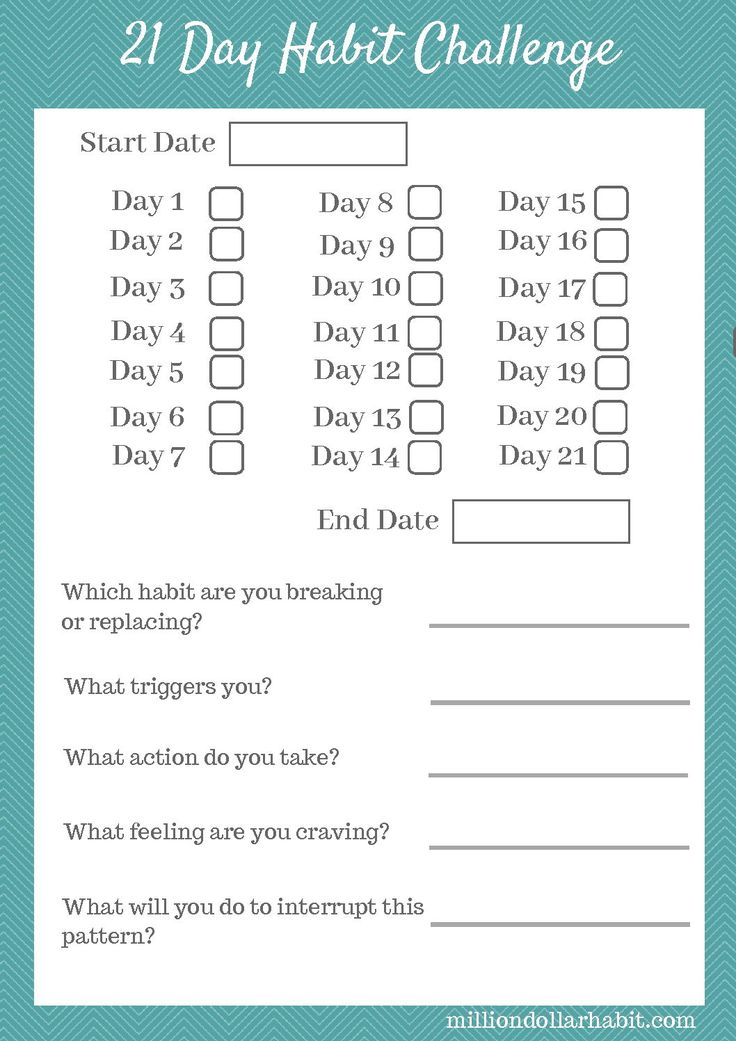 How do I know this?
How do I know this?
After 66 days this was looking at me.
By announcing my progress by putting an “X” next to every part of my morning routine (including the fourth box, which meant messages to a responsible partner), I created visual evidence day by day that translated into the confidence, motivation and momentum I needed to continue way.
My circling has finally turned into an upward spiral. I stuck to this habit - and now it stuck with me.
My tracking system, however, was only an outward confirmation of a deeper inner truth—an outward reflection of an inner transformation. Even though it was invisible to the eye, I was the designer of the neural construction project. My morning routine actually changed and strengthened the neural pathways in my brain that weren't there before. I wasn't just a habit designer. I was a neural architect.
But it wasn't just work that helped fix a new habit. Three more aspects were of fundamental importance.
How to build your neural Route 66
Now you understand the paramount importance of consistency.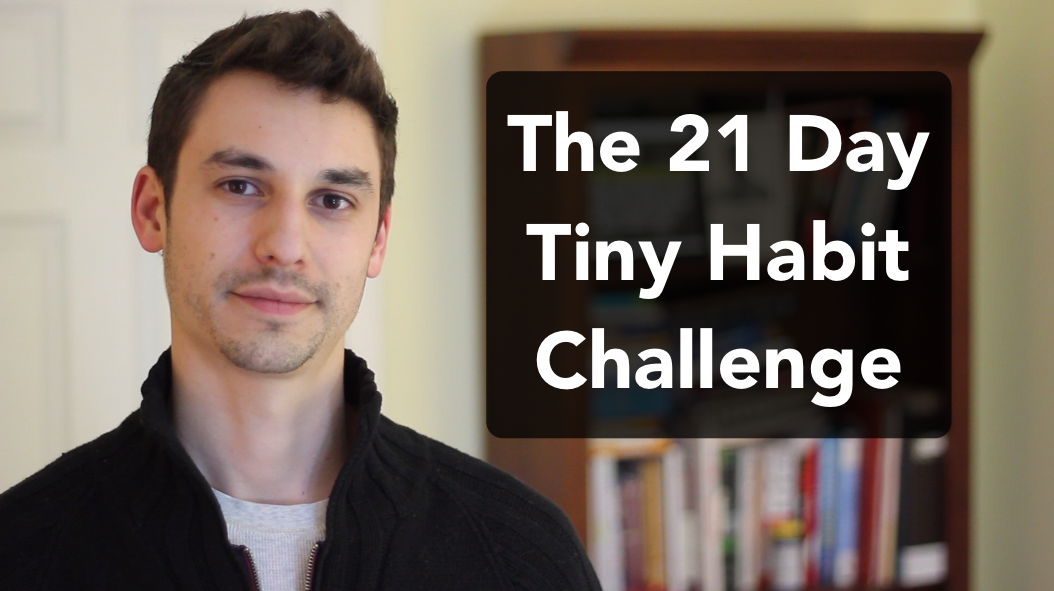 But understanding it and doing it are two different things.
But understanding it and doing it are two different things.
Here are three persistence tactics I use and tips for implementing them yourself.
1. Eliminate ambiguity
In my brain (as in all others) there is an inner lawyer who loves to take me off the hook. How did I outsmart him this time?
I got rid of any ambiguity. To do this, I defined my plan in black and white - so that there would be no room for mental falsification.
For example, I didn't just tell myself that I would do the three elements of the morning routine for an hour, I determined exactly how much time to allocate for each: 30 minutes for reading, 20 minutes for training and 10 minutes for meditation.
I also set a timer when I took each element and didn't stop until it fired. It may seem like a minor moment, but the brain is working hard to get rid of unnecessary effort. Setting external markers (such as a timer) helps the brain maintain honesty and keep the goal crystal clear.
The goal must be specific. Define it in measurable terms such as time, distance, repetitions, etc.
Once you have the values in place, make a measurement plan and try to make it part of your regular schedule.
2. Reinforce Habits with If…Then Plans
Another important point is creating if/then plans to strengthen my resolve at critical moments.
Since my new habit was about the morning routine, the problem arose with the night schedule. I usually went to bed an hour later than I wanted. Why? Because often I was too tired to take 10 minutes to brush my teeth and put on my pajamas. Instead, my brain, like a zombie, chose the easier option, like messing around or using social media.
Solution? "if...then" plans.
Psychologist Peter Gollwitzer has discovered that a remarkably simple if-then plan can automate behavior, making it easier to make the right decision in times of need. With an “if…then” plan, you effectively “pre-decide” what you will do in a given situation before it happens.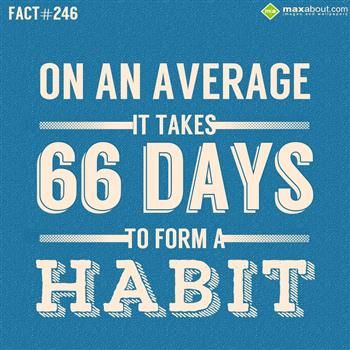 If ______, then _______.
If ______, then _______.
What was my if...then plan to go to bed early? If it's bedtime for my 5 year old daughter, I go to brush my teeth/put on pajamas before the bedtime stories start. As soon as she falls asleep, I immediately go straight to bed and win back the hour I lost earlier.
Although I didn’t plan ahead, I could use an if…then plan for the day I almost missed: if I get home after a busy day and realize I didn’t complete the program, I remind myself that the sequence is — The key for me is to form a habit, and make a routine at any time of the day.
3. Add "flexibility partner"
Another solution for me was to add responsibility.
I resisted this for a long time. I thought I could handle myself. But the fact that a friend was waiting for my daily report on the implementation of all parts of the routine added to my zeal in the task.
Why a "partner in plasticity" and not a partner in responsibility? Because for me the word "responsibility" seems heavy.![]() But more importantly, I love the idea that the other person helps me not only stick with the habit, but also rewire my brain!
But more importantly, I love the idea that the other person helps me not only stick with the habit, but also rewire my brain!
On the way to change
For me, behavior change was about doing something hard for 66 days.
Your habit may take a little less or a little longer. But the main thing was the willingness to look at the sagebrush of my new habit, to grit my teeth and do it again and again. As the father of American psychology, William James, once said:0003
“When acquiring a new habit or abandoning an old one, you need to rely on the strongest and most determined initiative… Never allow exceptions until the new habit is firmly established in your life. Each deviation is like throwing the ball that you have been so carefully reeling in. One pass is worth more than the number of turns you have to make again.”
Changing the cause of behavior is not so difficult because we cannot change. It's because we don't know how to do it... yet.